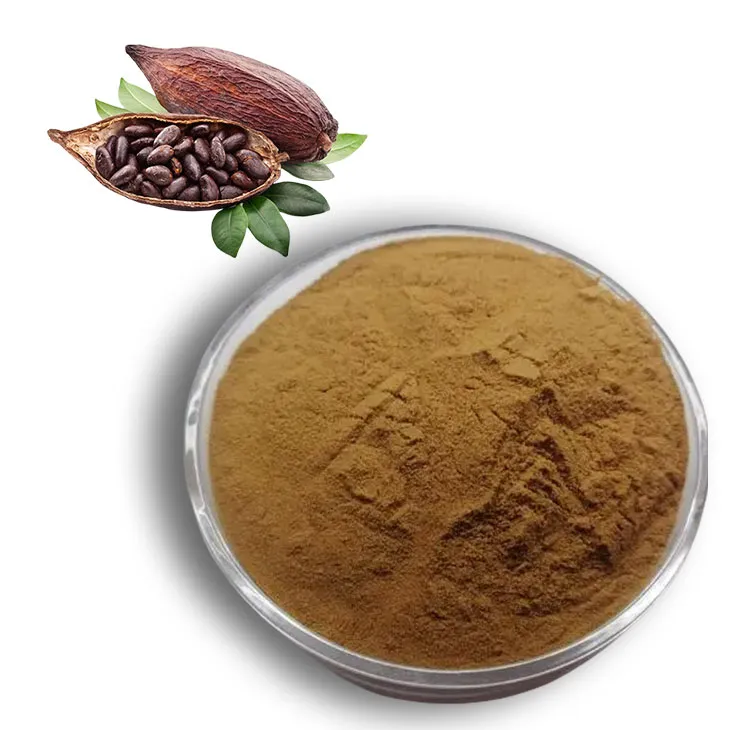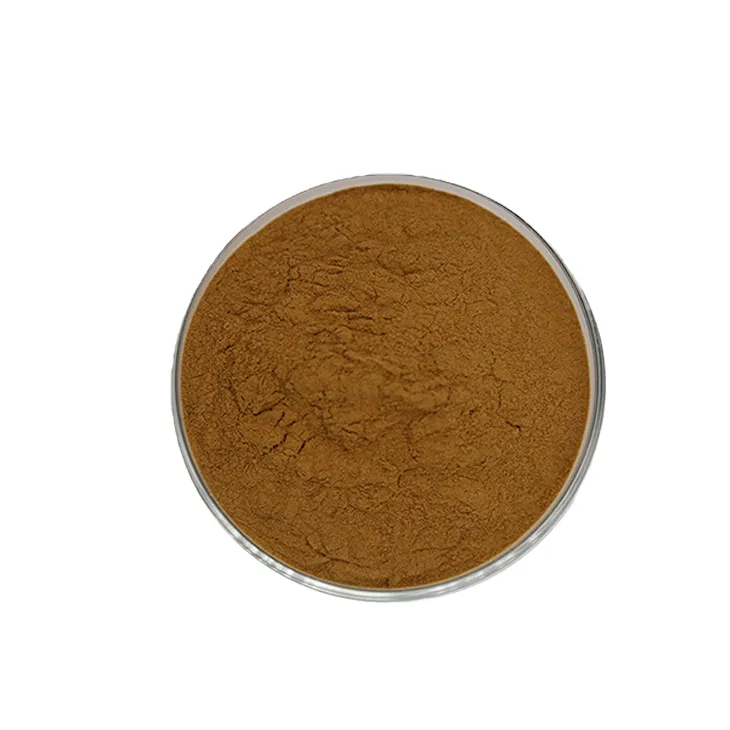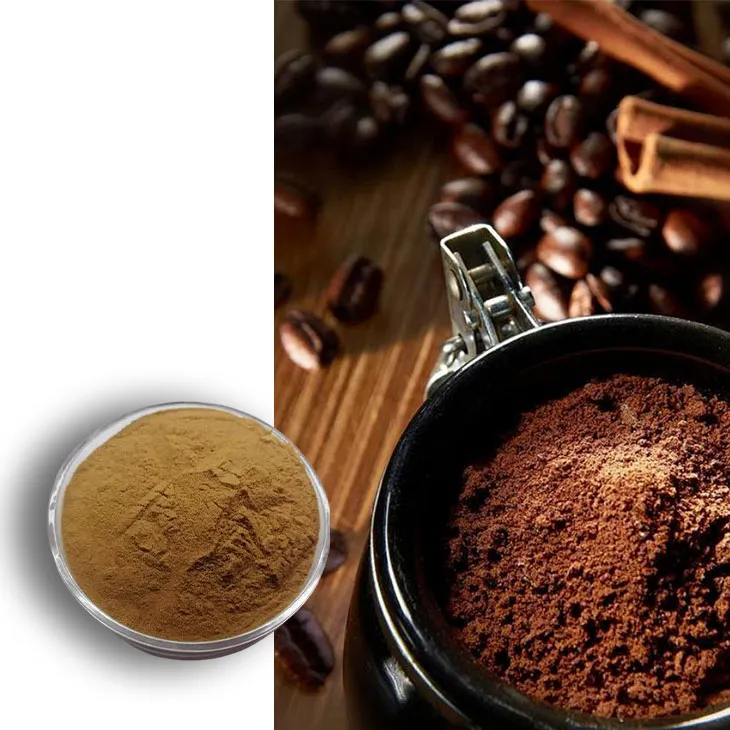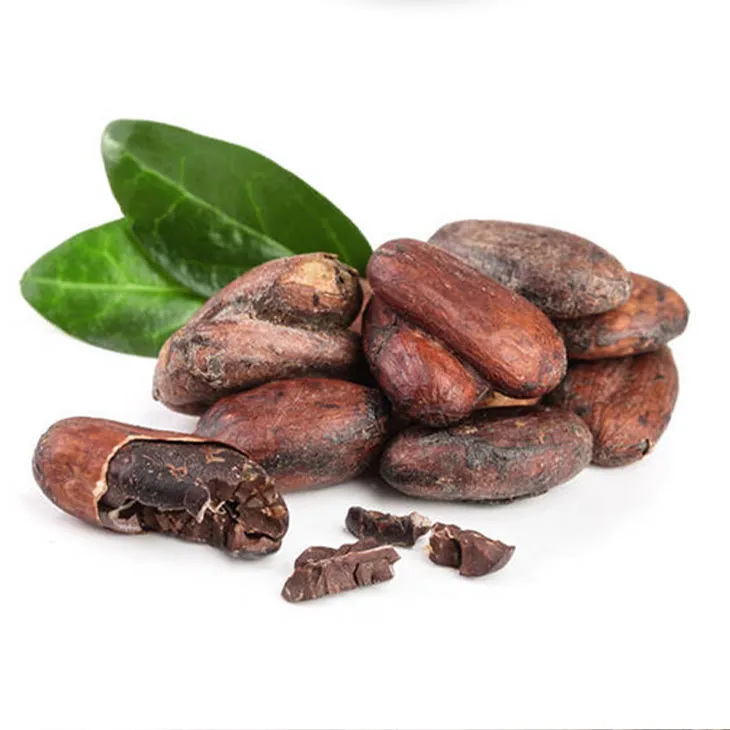- 0086-571-85302990
- sales@greenskybio.com
5 Effects of Cocoa Extract + Dosage, Side Effects
2024-11-11

1. Introduction to Cocoa Extract
Cocoa Extract is derived from the cocoa bean, which is the main ingredient in chocolate. It contains a rich variety of bioactive compounds, such as flavonoids, polyphenols, and theobromine. These components are responsible for the many potential health benefits associated with Cocoa Extract. In recent years, cocoa extract has gained significant attention in the field of health and nutrition due to its antioxidant, anti - inflammatory, and cardioprotective properties.

2. The Five Effects of Cocoa Extract
2.1. Antioxidant Effect
Cocoa extract is a powerful antioxidant. The flavonoids and polyphenols present in it are capable of neutralizing free radicals in the body. Free radicals are unstable molecules that can cause oxidative stress, which is linked to numerous health problems, including heart disease, cancer, and neurodegenerative disorders. By scavenging these free radicals, cocoa extract helps protect cells from damage and maintain their normal function.
For example, a study has shown that regular consumption of cocoa - rich products can increase the antioxidant capacity of the blood. This is important as it helps to counteract the daily exposure to environmental toxins and stressors that can generate free radicals in the body.
2.2. Anti - Inflammatory Effect
Chronic inflammation is a key factor in many diseases, such as arthritis, diabetes, and certain types of cancer. Cocoa extract has been found to possess anti - inflammatory properties. It can modulate the body's immune response and reduce the production of inflammatory mediators.
In vitro and in vivo studies have demonstrated that cocoa extract can inhibit the activation of inflammatory cells and the expression of genes related to inflammation. This anti - inflammatory effect may contribute to the prevention and management of various inflammatory - related diseases.
2.3. Cardioprotective Effect
One of the most well - studied effects of cocoa extract is its cardioprotective effect. It can improve blood circulation by several mechanisms. Firstly, it helps to relax blood vessels, which reduces blood pressure. The flavonoids in cocoa extract stimulate the production of nitric oxide in the endothelium of blood vessels. Nitric oxide is a vasodilator that widens blood vessels, allowing for smoother blood flow.
Secondly, cocoa extract can also lower LDL (bad) cholesterol levels and increase HDL (good) cholesterol levels. This helps to reduce the risk of atherosclerosis, a condition where plaque builds up in the arteries. Additionally, it may have anti - thrombotic effects, preventing the formation of blood clots that can lead to heart attacks and strokes.
2.4. Neuroprotective Effect
Cocoa extract may also have a neuroprotective effect. The flavonoids in it can cross the blood - brain barrier and exert beneficial effects on the brain. They can enhance cerebral blood flow, which is important for delivering oxygen and nutrients to brain cells.
Some research suggests that cocoa extract may improve cognitive function, including memory, attention, and learning ability. It may also have a role in protecting against neurodegenerative diseases such as Alzheimer's and Parkinson's. The antioxidant and anti - inflammatory properties of cocoa extract may contribute to the preservation of brain health by reducing oxidative stress and inflammation in the brain.
2.5. Skin Health Benefits
Cocoa extract can be beneficial for skin health as well. The antioxidants in it help to protect the skin from damage caused by ultraviolet (UV) radiation, pollution, and other environmental factors.
It may also improve skin hydration and elasticity. Some skincare products contain cocoa extract for its potential to promote a more youthful and healthy - looking skin. By reducing oxidative stress in the skin cells, cocoa extract can contribute to the prevention of premature skin aging, such as wrinkles and fine lines.

3. Dosage of Cocoa Extract
The appropriate dosage of cocoa extract can vary depending on the form of the extract (e.g., powder, capsule) and the intended use. In general, for general health benefits, a daily intake of 1 - 2 grams of cocoa extract (equivalent to about 10 - 20 grams of high - quality dark chocolate) may be sufficient.
However, if the aim is to target specific health conditions, such as high blood pressure or high cholesterol, higher dosages may be required under the guidance of a healthcare professional. For example, in some studies on cardioprotective effects, dosages of up to 5 grams per day have been used.
It is important to note that when consuming cocoa extract in supplement form, it is crucial to follow the recommended dosage on the product label. Overdosing on cocoa extract can potentially lead to adverse effects, especially considering the presence of theobromine, which can have stimulant - like effects at high levels.

4. Side Effects of Cocoa Extract
4.1. Theobromine - Related Effects
Theobromine is a compound found in cocoa extract. In large amounts, it can cause side effects similar to those of caffeine. These may include increased heart rate, restlessness, and insomnia. People who are sensitive to stimulants may be more likely to experience these effects.
For example, consuming a large quantity of cocoa - based products or taking high - dose cocoa extract supplements late in the day may disrupt sleep patterns. However, the amount of theobromine in normal dietary amounts of cocoa is generally well - tolerated by most people.
4.2. Allergic Reactions
Although relatively rare, some individuals may be allergic to cocoa or components in cocoa extract. Allergic reactions can range from mild symptoms such as skin rashes, itching, and hives to more severe reactions like difficulty breathing and anaphylaxis in extreme cases.
Those with known food allergies, especially to nuts (as cocoa products may be processed in facilities that also handle nuts), should be cautious when consuming cocoa extract and should consult a doctor if they suspect an allergic reaction.
4.3. Gastrointestinal Disturbances
High - dose cocoa extract or excessive consumption of cocoa - based products may cause gastrointestinal disturbances in some people. This can include symptoms such as nausea, vomiting, abdominal pain, and diarrhea.
These symptoms are more likely to occur when the digestive system is not accustomed to the high - fiber and potentially irritating substances in cocoa. To avoid such problems, it is advisable to start with a low dose of cocoa extract and gradually increase the amount if well - tolerated.

5. Conclusion
Cocoa extract offers a range of potential health benefits, including antioxidant, anti - inflammatory, cardioprotective, neuroprotective, and skin - health - promoting effects. However, it is important to be aware of the proper dosage and potential side effects. When considering using cocoa extract as a supplement, it is advisable to consult a healthcare professional, especially if you have pre - existing health conditions or are taking other medications. By using cocoa extract in a safe and appropriate manner, it is possible to enjoy its health - promoting properties while minimizing the risk of adverse effects.
FAQ:
What are the five effects of cocoa extract?
Cocoa extract can have effects such as improving heart health by potentially reducing blood pressure and cholesterol levels. It may also enhance mood, possibly due to its flavonoid content which can affect neurotransmitters. Additionally, it has antioxidant properties that help combat free radicals in the body. Another effect is that it may improve blood flow, which can be beneficial for overall circulation. Finally, it could potentially have a positive impact on cognitive function, although more research is needed in this area.
What is the proper dosage of cocoa extract?
The proper dosage of cocoa extract can vary depending on various factors such as the form of the extract (powder, supplement etc.) and the intended use. In general, for a cocoa powder extract, a typical dosage might be around 1 - 2 tablespoons per day. However, when it comes to supplements, it is best to follow the manufacturer's instructions. It is also important to note that consulting a healthcare professional is advisable before starting any new supplement regimen to ensure the dosage is appropriate for an individual's health status.
What are the side effects of cocoa extract?
Some potential side effects of cocoa extract may include digestive issues such as stomach upset, nausea or diarrhea, especially if consumed in large amounts. It may also cause allergic reactions in some individuals who are sensitive to cocoa or its components. Additionally, since cocoa contains caffeine and related compounds, it could potentially lead to symptoms like jitters, increased heart rate or insomnia in those who are sensitive to stimulants.
Can cocoa extract help with weight loss?
There is some evidence that cocoa extract may play a role in weight loss. The flavonoids in cocoa may help regulate metabolism and potentially reduce appetite. However, it is not a magic solution for weight loss. It should be part of a comprehensive approach that includes a balanced diet and regular exercise. More research is still needed to fully understand the extent of its impact on weight loss.
Is cocoa extract safe for everyone?
Cocoa extract is not safe for everyone. People with certain medical conditions such as heart problems, high blood pressure (if not properly managed), and those who are allergic to cocoa or its components should be cautious. Pregnant and breastfeeding women should also consult their healthcare providers before consuming cocoa extract as its effects on fetal development and infants are not fully known.
Related literature
- The Health Benefits of Cocoa Extract: A Comprehensive Review"
- "Cocoa Extract: Dosage, Efficacy and Safety Considerations"
- "Flavonoids in Cocoa Extract and Their Impact on Human Health"
- ▶ Hesperidin
- ▶ Citrus Bioflavonoids
- ▶ Plant Extract
- ▶ lycopene
- ▶ Diosmin
- ▶ Grape seed extract
- ▶ Sea buckthorn Juice Powder
- ▶ Fruit Juice Powder
- ▶ Hops Extract
- ▶ Artichoke Extract
- ▶ Mushroom extract
- ▶ Astaxanthin
- ▶ Green Tea Extract
- ▶ Curcumin
- ▶ Horse Chestnut Extract
- ▶ Other Product
- ▶ Boswellia Serrata Extract
- ▶ Resveratrol
- ▶ Marigold Extract
- ▶ Grape Leaf Extract
- ▶ New Product
- ▶ Aminolevulinic acid
- ▶ Cranberry Extract
- ▶ Red Yeast Rice
- ▶ Red Wine Extract
-
Sophora Japonica Flower Extract
2024-11-11
-
Green Tea Extract
2024-11-11
-
Okra Extract
2024-11-11
-
Europen Bilberry Extract
2024-11-11
-
Almond Extract Powder
2024-11-11
-
Ginger Extract
2024-11-11
-
Sugarcane Extract
2024-11-11
-
Longan Extract
2024-11-11
-
Grape Seed Extract
2024-11-11
-
Chia Seed Powder
2024-11-11





















